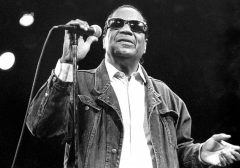Yesterday And Today
Blind Boys of Alabama Leader Clarence Fountain Passes
“He woke me up early this mornin’. And I was clothed in my right mind. And the blood was still runnin’ warm in my veins. Yet somebody out there is too mean to say thank you Jesus, for another day’s journey.” That was the way Blind Boys of Alabama’s Clarence Fountain used to introduce “Look Where He Brought Me From,” the group’s rousing hymn of praise to living in the spirit and being uplifted every day by the presence of the Almighty. But it also summed up Fountain ‘s approach to life and music as well.
Fountain, who passed away June 3 at the age of 88 in Baton Rouge, Louisiana, led the Blind Boys since the early ‘40s, his raucous delivery and electrifying stage presence inspiring many early soul men and rockers to copy his style and vocals. Fountain praised Jesus with panther screams that could quickly drop to menacing growls when he wanted to ward off the devil. Despite many attempts to draw him into more secular music, Fountain was steadfast in his gospel, although he grudgingly went along with some small secular concessions woven into the Blind Boys’ works in later years.
Sam Cooke’s manager, Bumps Blackwell, who also managed Little Richard, tried hard to get Fountain to cross over into rock and roll. “I couldn’t do it,” Fountain told me in an ‘03 interview for Creative Loafing from his home in Baton Rouge. “Broke and ain’t got no money, and I still wouldn’t do it. You can have a hotel full of money and lose your soul, you still ain’t got nothin.”
He did record a version of “Stand By Me,” in the ‘50s, but the sound was vastly different from the 1961 Ben E King hit. “It had the same name, but was altogether a different sound to what we was talking about,” Fountain said. King’s hit, written by Leiber and Stoller, was allegedly taken from Sam Cooke’s “Stand By Me Father,” which is more along the lines of what Fountain and the Blind Boys did. “We was talking about wanting to let the Lord to stand by us, and he was talking about he wanted a woman to stand by him. So that’s where your difference come in. Blues and gospel go hand in hand, and ain’t nothing different in singing the blues and the gospel is the lyrics. We talk about Jesus and God, and they talk about love and the baby, and my baby, you know – and that’s the only difference, just the lyrics change.”
Fountain wasn’t so receptive about some of the cuts on 2001’s Spirit Of the Century, which won a Grammy for best traditional gospel album even though some of the material was nothing close to traditional. Fountain had a problem when producer Don Chelew, who produced John Hiatt’s Bring the Family, suggested that the group sing “Amazing Grace” to the tune of “The House Of The Rising Sun.”
“I thought it was stupid,” Fountain said succinctly. “If it had been the real ‘House of the Rising Sun,’ I’d have told him that was no good, you sing it yourself. We’re not supposed to mess with tunes like ‘Amazing Grace.’ But we had got lucky and come out on the sinning end because the Lord was on our side.”
Anyone who witnessed the Blind Boys live with Fountain at the helm would have no trouble believing whose side they were on. Fountain didn’t do much preaching in a set, but he let you know in no uncertain terms who they were playing for and why. With the soul-stirring, pipe-organ thrum of the Blind Boys backing him, Fountain sung the praises of his savior like a rock star. He and current leader Jimmy Carter shared the co-lead spot, with Carter taking his share of the glory with journeys into the aisles, where he’d spin while holding a note for minutes longer than a man of his advanced years ought to be able to. But he still had to hand off to Fountain, who always made sure the crowd knew not only what the message was but how deep the conviction was of the man who was delivering it.
’Even though illness had prevented Fountain from touring the the group for several years, his voice was still heard on the band’s latest, Almost Home. Fountain has completed his journey, but his sound and his spirit will live on.
Reprinted with permission by No Depression.











